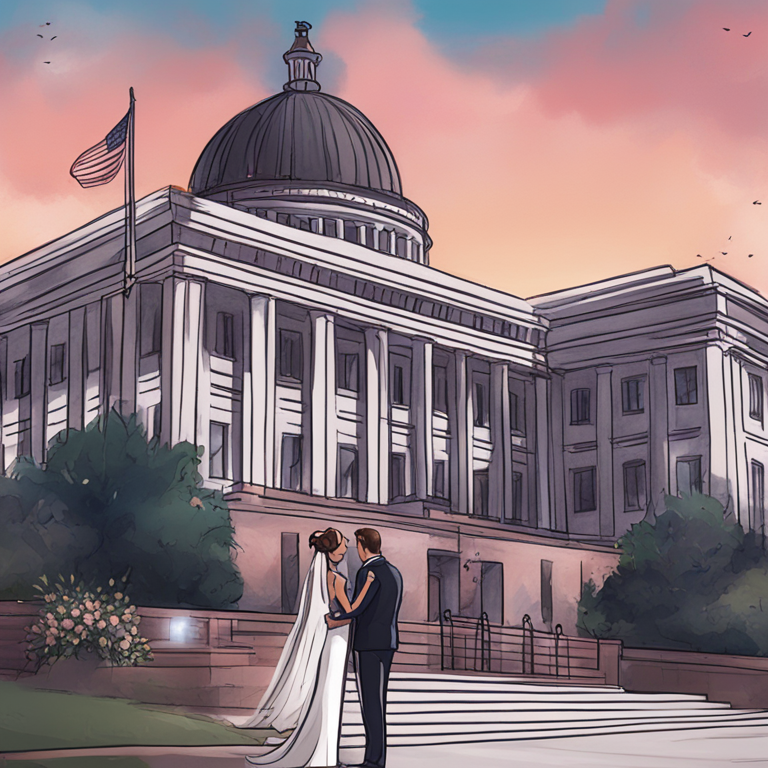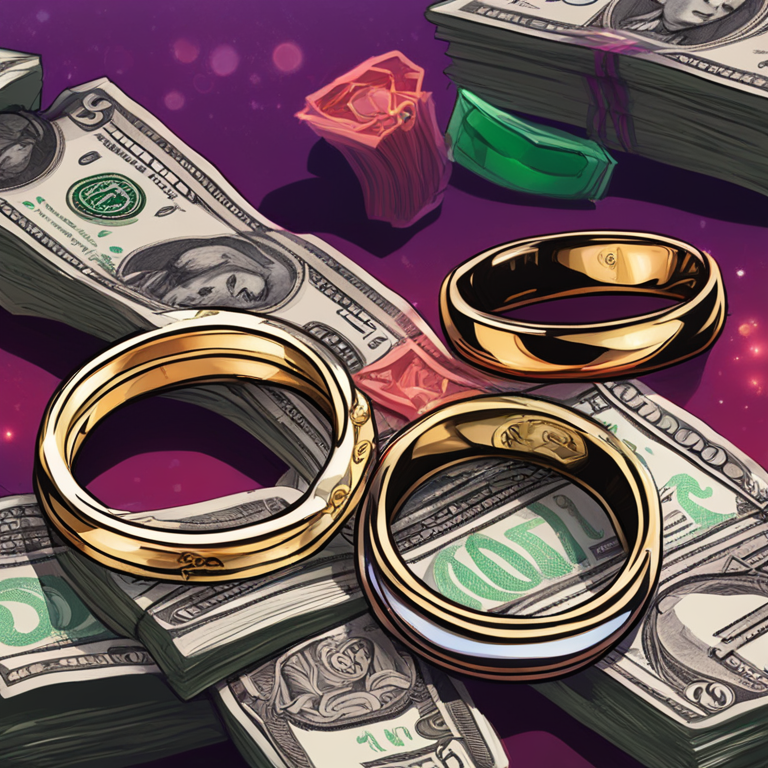
Introduction
Imagine a world where marriage is as flaky as a crescent roll and love is tossed around like a frisbee at a summer picnic. Welp, welcome to the era where fiat money doesn't just affect your pocket but your "til-death-do-us-part" vows too! So buckle up, as we embark on a whirlwind tour of how fiat money, in its sneaky, insidious ways, has managed to pull the rug out from under the institution of marriage. Keep reading to see just how deep this rabbit hole goes!
Debasement of Love and Marriage
Evolution of Love
Once upon a time, love was a grand, noble thing requiring sacrifice, discipline, and a level of patience that would make even a monk jealous. Imagine love back then as an Olympic event, with only the most dedicated getting gold. Nowadays, love is more like a participation trophy handed out at preschool—everyone gets one, and it doesn’t mean much. This shift from 'virtue' to 'feeling' has been quite the rollercoaster ride. Today, saying "I love you" can be as shallow as declaring your fondness for a new pizza flavor or the latest Netflix show. We’ve reduced what used to be a powerful force for good into something fleeting and trivial, like a Wi-Fi signal at a crowded Starbucks. So, how did we get here?
Impact on Society
The fallout of love's demotion hasn’t been just about words losing their luster; it’s wreaked havoc on society at large. The downgrading of love has dovetailed with the collapse of the family unit, turning it into a fragile structure, practically made of glass. High time-preference behavior has infiltrated relationships, with people prioritizing instant gratification over long-term gains. Imagine building a house of cards next to an open window; that's pretty much the state of modern marriages. The impact has been profound, with commitment and sacrifice being replaced by quick exits and easy outs, much like how you would swipe left on a Tinder match who uses Comic Sans in their bio.

No-Fault Divorce Law
Historical Context
Enter stage left: the game-changer of 1969, the No-Fault Divorce law. This legislation, like a misguided superhero, aimed to reduce the drama and recrimination in divorce by removing the need for one party to prove the other was at fault. On paper, it sounded like a win, much like the idea of pineapple on pizza (hey, some people love it!). Before this law, spouses needed legitimate reasons to split—think infidelity, abuse, or mental cruelty—not just because they were bored or found someone who didn't snore as loudly. However, just like many things that glitter, this law wasn’t all gold. Instead of alleviating the bitterness, it merely sugar-coated the process while enabling marital breakups to skyrocket, leaving behind a trail of broken promises and shattered families. If you think reality TV made divorces messier, think again.
Consequences and Unintended Effects
So, what went wrong? Whose idea was it to make marriage contracts easier to break than a New Year's resolution? The issue lies in the fundamental purpose of marriage: providing a stable environment for raising the next generation. By eliminating the necessity for fault, marriage lost its teeth—no longer a binding promise of lifetime fidelity. Imagine trying to play Monopoly without any rules; fun at first, but utter chaos follows. Now, anyone can opt-out of marriage without penalty, and the fallout is everywhere. Divorce has become an industry, legal battles have gotten nastier, and the institution of marriage, once the keystone of societal stability, now feels about as solid as a wet cardboard box. Essentially, marriage today is less a steadfast commitment and more like an easily-canceled subscription plan.

Government regulation of marriage
Okay folks, let’s talk about marriage and government regulation. If you’re thinking, “Well, what do these two things have in common besides a lot of paperwork?”—you’re about to find out. Picture this: once upon a time, a marriage promise was all about lifelong fidelity and creating a stable environment for raising little munchkins. Sounds quaint now, doesn’t it? By throwing in the government with its slew of regulations, the whole deal gets complicated—like, more complicated than your Facebook relationship status. Stay with me, because this rabbit hole is deeper than you think.
Marriage as a contract
Marriage, at its core, was always supposed to be a contract. No, not like that cell phone plan you regret signing up for, but an actual contract centered around the idea of long-term fidelity. It wasn’t about feeling warm and fuzzy all the time; it was about stability, particularly for the kiddos. The idea was to create a fortress of stability that even your in-laws couldn’t breach. Keeping this promise meant your partner wouldn’t be chasing after the next shiny thing that came along. Instead, they’d be there through thick, thin, and that awkward phase where you decided to grow out your hair. It’s like signing up for a zero-yield bond but with a more adorable payoff: well-raised kids.
Historical government control

The idea of government meddling in marriage? Surprisingly recent. Originally, people didn’t need Big Brother to validate their love lives. Government control came into the picture mainly because of historical quirks like preventing interracial marriages and polygamy (because why have one set of in-laws when you can have multiple?). Marriage registration? That wasn’t always a thing. Back in the day, folks didn’t have to rush to City Hall for a marriage license; they just made vows and sometimes, shockingly, stuck to them. But fast forward a few blinks and voilà, marriage became entangled in the bureaucratic web with unintended consequences like a Marvel movie subplot that could’ve been left out.
Legal weakening of marriage contracts
Effects of no-fault divorce
If you think marriage is tough, imagine it without any rules. Say hello to No-Fault Divorce, the ultimate wildcard. In 1969, Governor Ronald Reagan of California introduced the first No-Fault Divorce law, making it possible to end marriages without having to blame anyone. It sounded as refreshing as a cold lemonade on a hot day. Before then, you needed solid grounds like physical abuse or infidelity to call it quits. Sometimes, people were forced to make up wild accusations just to get a legal nod for a divorce—Reagan’s own first wife cited ‘mental cruelty.’ Fast forward, and now anyone can hit the eject button without any particular reason. Ironically, instead of reducing drama, it brewed even more chaos, much like that one spicy friend who loves to stir the pot at social gatherings.
Shift in marriage perception
The changes didn’t stop there. Thanks to the sudden trend of no-fault divorce, marriage perceptions started to shift like sand dunes in a desert storm. Gone were the days when marriage was a fortress built on duty and sacrifice for the community. Instead, modern-day marriage became a cozy cabin built for two—and sometimes only one if things didn’t pan out (hello, solo Netflix binges). It turned into a quest for personal happiness, detached from ideas of duty or, God forbid, raising children. New priorities started to surface, and marriage became less about a communal institution and more about personal contentment, like having a really nice mattress you don’t want to leave in the morning.
Contrasts in marriage views
Community-centered vs. self-centered views
Time to hop into our DeLorean and go back about a century. Back then, if you asked someone about the purpose of marriage, they’d talk your ear off about duty to children, sacrifice for the community, and obligations to family. It wasn’t exactly the most riveting cocktail conversation, but it was grounded. Fast forward to our selfie-obsessed era, and marriage talk usually revolves around love. Like, “I love you more than my Wi-Fi connection.” You bet the difference is staggering. The old-school ethos was community-first, whereas today’s version is more ‘me-first, because YOLO.’ Essentially, our ancestors saw marriage as building blocks for society, while today it’s often seen as a pathway to personal satisfaction. Ever try building a house with just marshmallows? Exactly.
The role of sacrifice and responsibility
Believe it or not, things like sacrifice and responsibility used to be the bedrock of marriage. Doing the hard things, like saving for a rainy day or sticking together through thick and thin, was all part of the marital gig. But in today’s fast-living, Instagram-filtered world, such virtues are as rare as a unicorn at a dog park. The names of the game are instant gratification and personal happiness. This mindset shift has led to fewer stable environments for raising children—think more “Game of Thrones” chaos rather than “Brady Bunch” harmony. Nowadays, people want the benefits without the blood, sweat, and tears. It’s like wanting six-pack abs without ever doing a crunch.

Fiat money and marriage
Love—once a virtue celebrated for its profound depth and enduring commitment—is now often reduced to a fleeting emotion. A scroll through social media reveals "love" for everything from ice cream to Netflix shows. So, what's changed? Enter: fiat money and government intervention.
In the golden days of yore, love was synonymous with sacrifice, discipline, and patience. Fast forward to today, the word has been devalued more than the trophies at a kids' soccer tournament. But hey, this isn't just a nostalgic lamentation about how words have lost their meaning—it’s about how fiat money and government policies have chipped away at the very fabric of marital bliss.
No-fault divorce laws, for example, intended to reduce the bitterness in divorce proceedings, have paradoxically escalated it, according to more than five decades of evidence. And while you can no longer get in trouble for cheating in a legal sense, might as well ask the government to throw in some candies to diabetic patients every meal—same result, different scenario!
The tangled saga of marriage and state gets more twisted when we realize that historically, marriage existed away from government control. However, attempts to regulate marriages to prevent bizarre unions (think polygamy, interracial marriages) gradually led to mandatory registration. And voila! Government regulations have been rocking the marriage boat ever since.

Bitcoin and long-term thinking
Amid the whirlwind of short-term gratification and cryptocurrency rollercoasters, it’s delightful to see Bitcoiners embracing the antiquated virtues of marriage. When you delve into Bitcoin, you start thinking long-term, naturally extending this behavior into other aspects of your life—yes, even marriage.
Need an example? Well, the Bitcoin community loves to put a ring on it. This low-time preference behavior isn’t just about stashing sats; it's also about building a life that's got meaning, sacrifice, and gasp!—commitment. The long-term mindset fosters families and instills values that don’t flicker away at the sight of a meme coin.
Traditional views of marriage gel well with this long-term thinking. Low time-preference behavior, often lauded as wisdom by ancient philosophers, is the perfect antidote to our current obsession with immediate emotional highs. Dating apps, swiping left, and casual flings may offer instant gratification, but are unlikely to provide the same depth or stability as a committed relationship.
Cast a side-eye at those Beatles lyrics "Love is all you need." When the very notion of love has been diluted, merely feeling "in love" isn't enough. Marriage isn't solely for personal happiness but is about long-term commitment, family, and finding deeper meanings.
Encouraging marriage
Let’s be real—fiat money hasn't just debased currency but has also subtly debased our societal structure, including marriage. With governments stepping in to "solve" our issues via monetary policy, the concept of personal responsibility took a backseat. This was a love affair with short-term fixes at the expense of long-term stability.
Remember the Great Society programs and no-fault divorce laws? They may have sounded wonderful on paper—like that fad diet you swore by—but their unintended consequences have been less than stellar. These policies nudged society towards a focus on individual happiness and led to the erosion of familial structures.
Bitcoiners, however, seem to get it. They are all about that long game. Many in the Bitcoin community are donning wedding rings, driven by low time-preference behavior inspired by their sound money investments. As they anticipate holding onto their BTC for decades, the value of long-term relationships and resulting family structures becomes glaringly evident.
Promoting low time-preference behavior
One might wonder: Why are Bitcoiners obsessed with long-term thinking and making vows of eternal loyalty? The answer lies in the nature of Bitcoin itself. As you immerse yourself in the world of hodling and scarcity, your mindset shifts to prioritize future gains over immediate pleasures.
When you're betting on Bitcoin to secure your financial future, you begin to understand the value of commitment, sacrifice, and planning. This change mirrors how society once viewed marriage—focused on stability, community, and the future well-being of the family unit.
So, while fiat money might've played the role of the mischievous villain, eroding trust and stability, Bitcoin emerges as the hero teaching us the virtues of patience, long-term planning, and faithfulness. Who knew a digital currency could rekindle our faith in lifelong commitments?
As the Bitcoin community continues to grow, it might just lead a quiet revolution in prioritizing lasting, meaningful relationships. Be it regulation-free promises of fidelity or the unwavering confidence of low time-preference investments, the future might just be brighter, and dare we say, more loving with Bitcoin.
Ethan Taylor
Ethan Taylor here, your trusted Financial Analyst at NexTokenNews. With over a decade of experience in the financial markets and a keen focus on cryptocurrency, I'm here to bring clarity to the complex dynamics of crypto investments.



